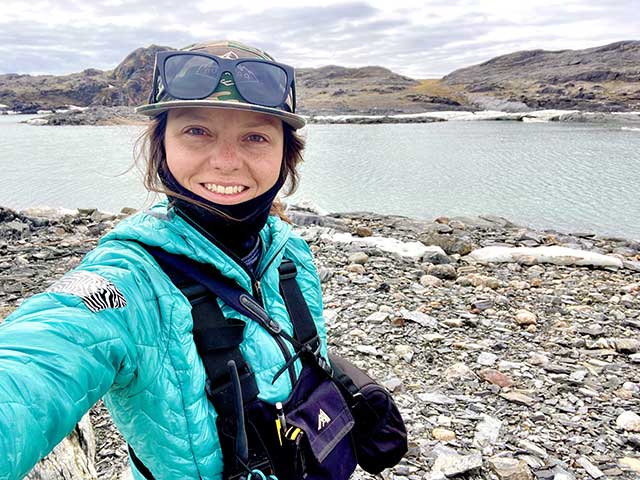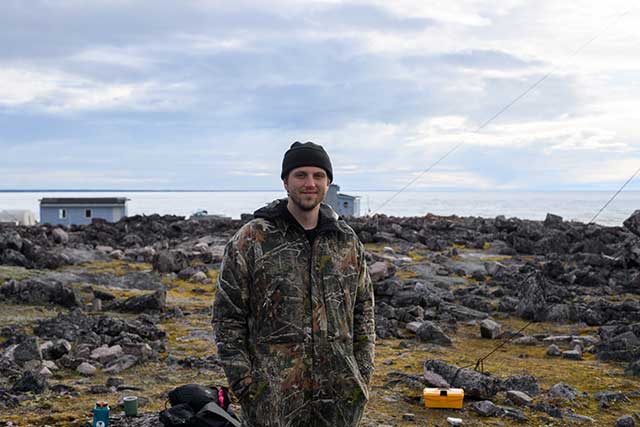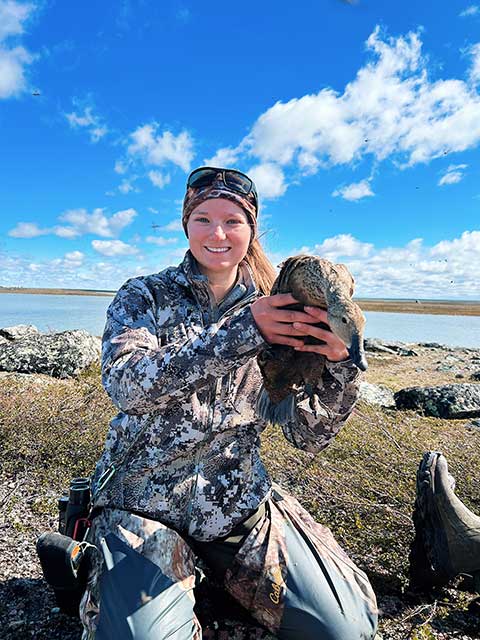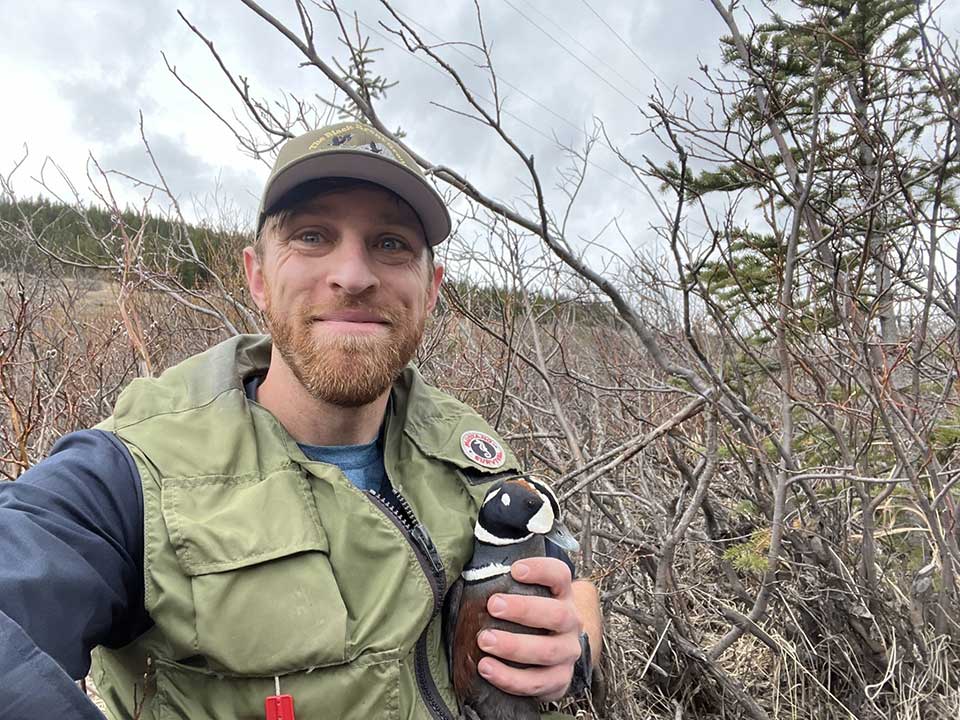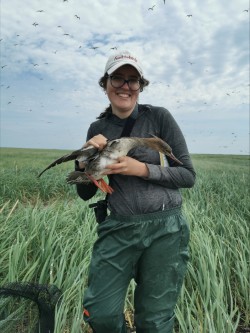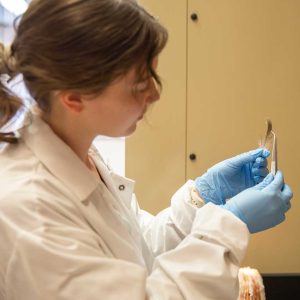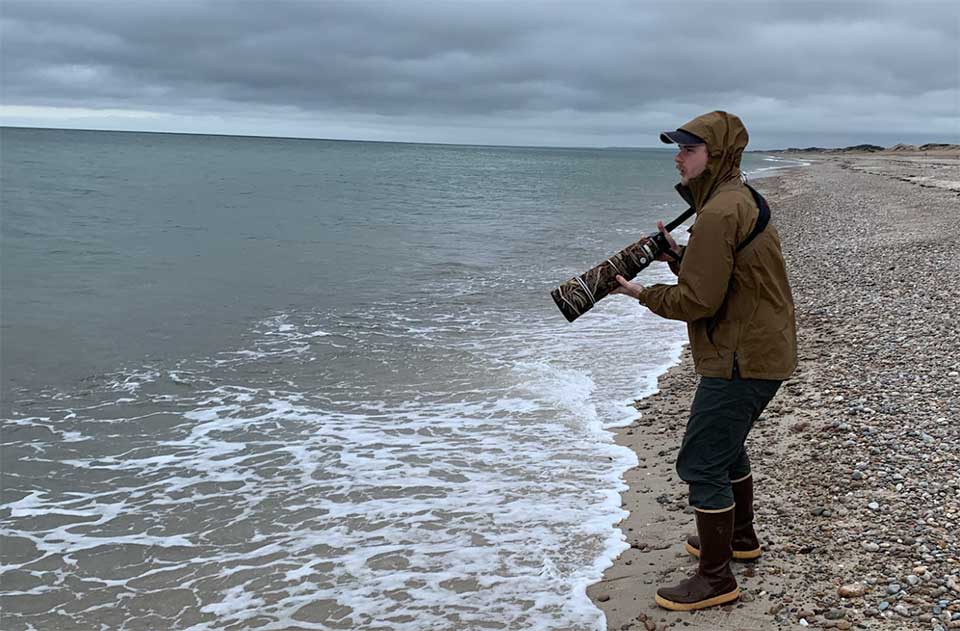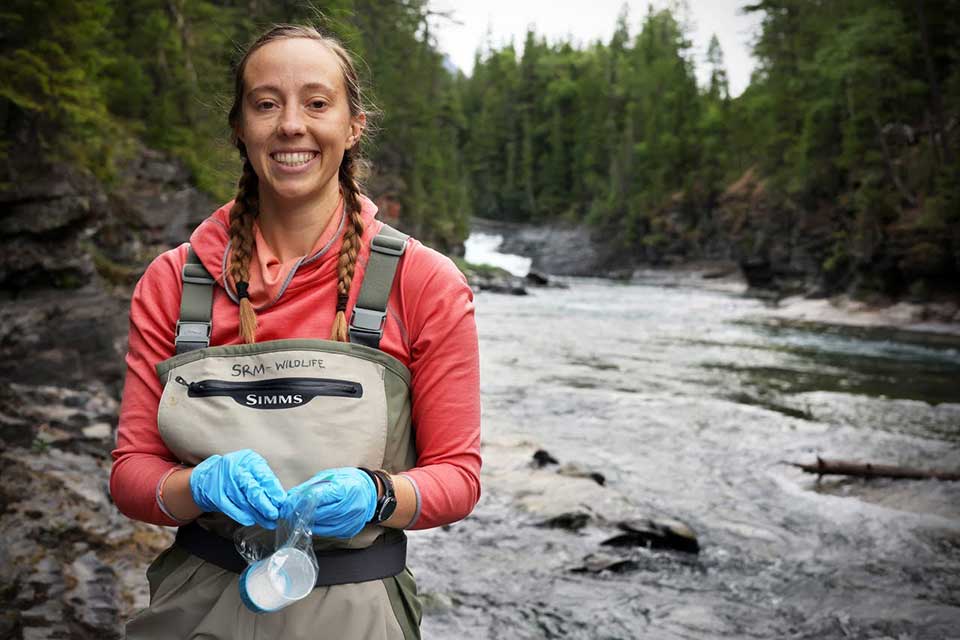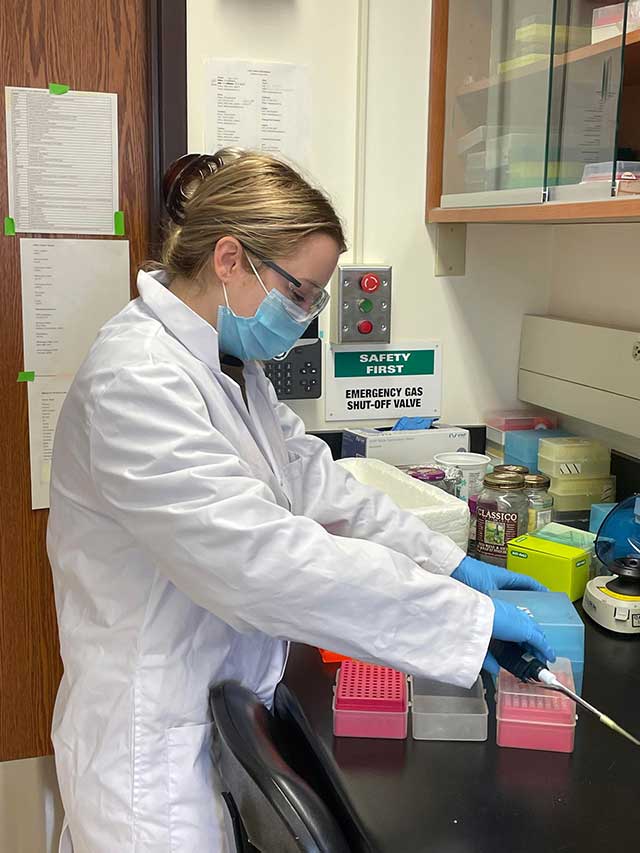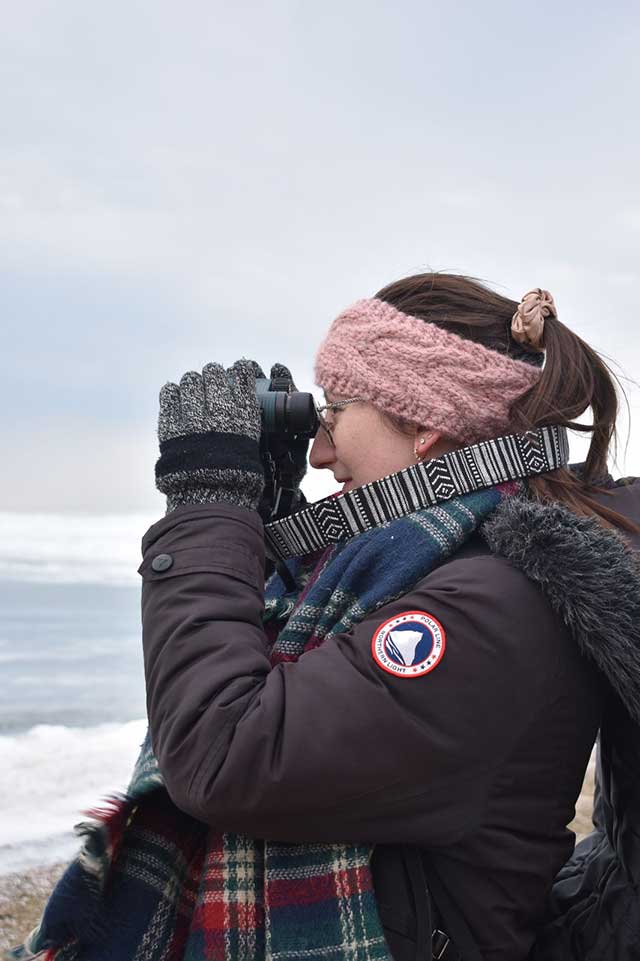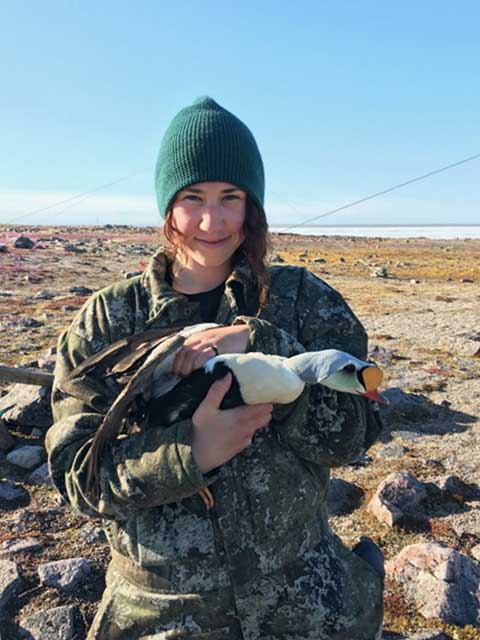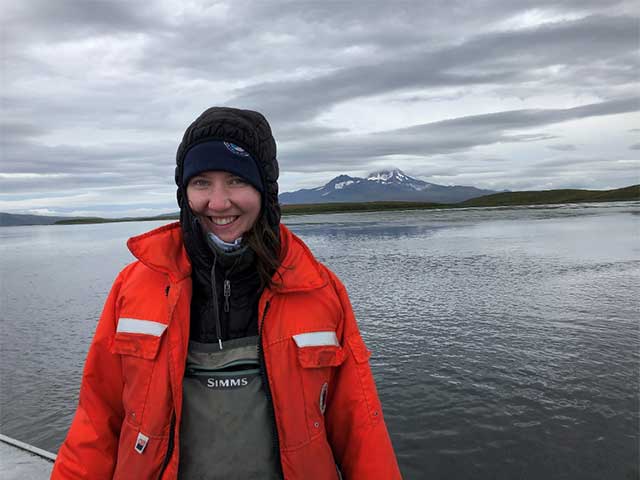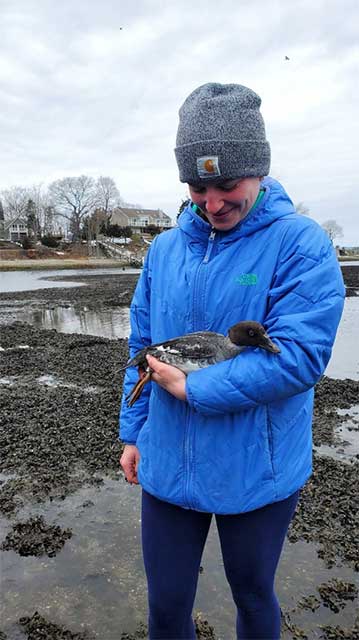Recipients of SDJV Student Fellowship Awards
The Sea Duck Joint Venture is honored to announce the recipients of the Sea Duck Joint Venture Student Fellowship Awards:
2025 Recipients
Kt Miller
Project Title: Calories and culture: socioeconomics of eider duck harvest to inform food security and well-being through Inuit knowledge in Kinngait, Nunavut
Kt Miller is a Ph.D. candidate at Carleton University and aims to use her SDJV fellowship to investigate the socioeconomics of eider duck harvest at a local scale in Kinngait, Nunavut. Kt’s research will bring together Inuit knowledge and western scientific methods to characterize how variation in sea ice and increased harvest risk impacts the ability of Inuit communities to harvest meat, eggs, and feather down, thus impacting food security for Inuit communities. This will include using GIS and survey data to evaluate harvest costs, and will assess how this has changed over time through working closely with Inuit communities to gather qualitative and quantitative data. She will also investigate what actions might be taken to mitigate the cost of harvest, and will develop a model to evaluate decision-making among Inuit harvesters in the face of changing sea ice, polar bear risk, and other socioecological variables.
Jacob Peterson-Galema
Project Title: Do predator refugia exist for eider hens? Examining the spatiotemporal drivers of polar bear foraging patterns and eider anti-predator responses on East Bay Island (EBI), Nunavut.
Currently a Master’s student at the University of Windsor, Jacob’s research examines how spatiotemporal factors affect eider hen anti-predator responses to approaching polar bears across East Bay Island, Nunavut. This includes factors such as bear movement, habitat characteristics, surrounding nesting density, ambient temperature, and incubation date. To do this, he will first investigate spatial and/or temporal variation in bear space use as an indicator of polar bear predation pressures using trail cameras and drone surveys. He will then use mapping software in ArcGIS to assess if eider hen anti-predator responses, such as flush response, flush initiation distance, and time to return to nest, are influenced by these landscape features and temporal factors in nesting areas, ultimately to assess eider hen adaptive capacity. Given increased inland polar bear activity and predation pressure upon eiders, this project will provide valuable insight into future eider population dynamics on East Bay Island.
Camryn Vestby
Project Title: Assessing the influence of environmental drivers and light goose population dynamics on components of king eider recruitment in the central Canadian Arctic
Camryn is a Master’s student at the University of Saskatchewan, where she is studying King Eider breeding biology. Specifically, she will investigate the extent to which climate, local weather variation, and phenology explain clutch size and nesting success of king eiders at Karrak Lake. She will also examine if changes in Lesser snow goose and Ross’s Goose colony size, density, and reproductive success explain the variation seen in King Eider clutch size and nest success using a long-term dataset collected between 1995 and 2019. This data can help inform future sea duck management decisions at Karrak Lake and can bolster our understanding of sea duck population dynamics and environmental pressures.
2024 Recipients
Rob Blenk
Project Title: Use of next-generation genomic sequencing to assess population structure for West Coast populations of Harlequin Duck
A PhD Candidate at the University of California, Davis, Rob Blenk plans to use his SDJV fellowship to support research on Harlequin Ducks. Specifically, he aims to use next-generation genomic sequencing to explore if there is evidence of genetic structuring in populations of Harlequins found in Alaska, British Columbia, and the continental U.S. He also intends to look for signatures of genetic structure between interior and coastal populations in the Western U.S. and compare genetic signatures from different wintering and breeding regions. More broadly, his research has focused on a variety of North American waterfowl, wetland biology, and other avian groups.
Emily Burt
Project Title: Ecological, social, and evolutionary factors that promote conspecific brood parasitism in the Red-breasted Merganser
Emily Burt is a student at McGill University, where she is currently a Master’s student who is aiming to apply for a PhD. She has been working with Red-breasted Mergansers for three years and plans to use her SDJV Student Fellowship to continue that work as part of her graduate studies. Her project will investigate the ecological, social, and evolutionary factors that lead to and promote conspecific brood parasitism in colonially-nesting Red-breasted Mergansers in a coastal archipelago in New Brunswick. This will involve identifying parasitic females, modeling the costs and benefits of parasitism for the host, evaluating genetic structure within the study population, and studying host selection and host-parasite interactions in the nest.
Sarah Endyke
Project Title: Improving estimates of migratory connectivity of juvenile Long-tailed Ducks and Surf Scoters using a dual isotope approach
Currently a Ph.D. student at the University of Maryland Center for Environmental Science Appalachian Laboratory, Sarah Endyke’s research aims to use new and non-traditional methods to conduct research with conservation implications for two sea duck species. Specifically, with her Student Fellowship, she will expand on stable isotope analyses funded by the SDJV to investigate the geographic origins and migratory connectivity of juvenile Long-tailed Ducks and Surf Scoters using both dual-isotope and single-isotope analysis. She will compare the data from both methods, predicting a dual-isotope method will improve the accuracy and precision of the overall analysis when it comes to determining the natal origin and evaluations of connectivity. Learn more about her in her recent SDJV fellowship feature.
2023 Recipients
Jacob Hewitt, M.S. Candidate, State University of New York – Brockport
Project Title: Estimating annual recruitment of sea ducks in the Atlantic Flyway using age ratios
Information on population demographic parameters in sea ducks provides valuable insight for migratory game bird managers seeking to maintain sustainable harvest. However, population monitoring capacity for sea ducks is limited relative to other migratory game bird species due to their remote breeding distribution. To estimate annual recruitment in sea duck populations, the U.S. Fish and Wildlife Service uses Parts Collection Survey (PCS) juvenile proportions (juveniles per adult), though estimates are likely biased due to differential harvest vulnerability between age cohorts. In 2018, the U.S. Fish and Wildlife Service in partnership with state and provincial agencies across the Atlantic Flyway initiated a direct-count photo survey of Long-tailed Duck, Black Scoter, Surf Scoter, and White-winged Scoter populations wintering on the Atlantic Coast and the Great Lakes to generate improved estimates of annual recruitment.
In Jacob’s Master’s thesis research, he will compare PCS juvenile proportion estimates with photo survey estimates to evaluate differential vulnerability bias and calibrate historic PCS estimates. Thereafter, he will use calibrated PCS estimates to examine broad-scale climate and habitat factors across sea duck breeding ranges that may drive inter-annual variation in sea duck annual recruitment.
Jacob Hewitt is Master’s student in the Environmental Science and Ecology program at SUNY-Brockport. His first experience working with sea ducks came during his undergraduate work at University of Wisconsin-Stevens Point, where he assisted with long-tailed duck capture efforts on Lake Michigan. Since graduating with his B.S., he continued studying sea ducks in Montana and Alaska, while also working with a broad range of other avian taxa across all four flyways. He seeks to continue supporting sea duck conservation efforts and studying avian ecology after completing his Master’s thesis.
Hewitt, J. E., Roberts, A. J., Sullivan, K. M., & Straub, J. N. (2025). Photo survey estimates of annual recruitment in eastern North American sea duck populations. The Journal of Wildlife Management, 89(3), e22714. https://doi.org/10.1002/jwmg.22714
Hewitt, J.E. 2023. Evaluating annual recruitment of sea duck populations in the Atlantic Flyway using harvest and photo survey juvenile proportions. M.Sc. Thesis. State University of New York Brockport. Brockport, NY, USA. 112p.
Holli Holmes collecting eDNA samples to detect presence of Harlequin Duck in a stream in Glacier National Park.
Holli Holmes, M.S. Candidate, University of Montana
Project Title: Investigating non-invasive survey methods for occurrence and reproductive success of the Harlequin Duck
Long term monitoring on bellwether streams in Glacier National Park in Montana and Banff National Park in Canada have shown a decline in breeding populations of Harlequin Ducks over the last twenty years. In fact, breeding Harlequin Duck populations in the contiguous Unites States are considered imperiled or critically imperiled depending on the state. Apart from these bellwether streams, biologists and land managers across the Harlequin Duck breeding range in the Northern Rockies have struggled to understand the status and trends in breeding populations. Previous survey methods have primarily relied on direct, in-person observations. These ground surveys are limited in the information they can provide, and counts can be highly variable because of factors outside the observer’s control. Working with non-game biologists across the Northern Rockies, it is clear there is an interest and need for more effective survey methods of the Harlequin Duck. Two increasingly popular methods for surveying wildlife occurrence that have not yet been used on stream-residing waterfowl, environmental DNA (eDNA) and camera trapping, could help address these concerns.
For her master’s research, Holli Holmes will be evaluating what sampling effort is required to assess occupancy state using different sampling strategies. Holli will also be building a predictive occupancy model for Harlequin Duck in the Northern Rocky Mountain region that can be used as a management tool. Holli’s work is focused on laying the foundation for building a new monitoring program for Harlequin Duck across the Northern Rockies.
Holli’s interest in birds began in her undergrad at Colorado State when she “accidentally” stumbled upon the Ornithology Club. Since her undergrad she has worked seven different wildlife jobs across the intermountain west. Four of those seasons were spent in Glacier National Park where her interest in Harlequin Ducks blossomed. While working in Glacier in 2021 she began collaborating with non-game biologists across the region to gain support to build a pilot study for what is now her Master’s work.
Holmes, H.A. 2025. Investigating non-invasive survey methods and building a predictive occupancy model for Harlequin Ducks in western Montana and northern Idaho. M.Sc. Thesis. University of Montana. Missoula, MT, USA. 92p.
Shayla Kroeze, Ph.D. Candidate, Queens University
Project Title: Understanding cholera immunity in common eiders in the Canadian Arctic using whole genome analysis
Disease is an increasing threat for Arctic species. For example, climate change is causing an increase in disease vectors such as mosquitoes; however, critical information on the genetics of disease resistance is lacking. The common eider (Somateria mollissima) is a colonial breeding sea duck that is an important source of fresh protein and feathers in northern communities and is an integral part of coastal and Indigenous culture. In 2006, avian cholera killed >30 % of hen eiders breeding at the largest colony in the eastern Arctic (Mitivik Island, Nunavut, Canada). Shayla’s research will use cutting-edge genomic and computational techniques to (1) Identify genes that may provide resistance to cholera in eiders; (2) Determine how these genes have changed before, during, and after the cholera epidemic; and (3) Characterize the distribution of identified genes in eider populations throughout the species North American range, including populations that have no reported cholera exposure. This will provide valuable insight into the population genetics of disease resistance in wild populations, and the vulnerability of Arctic duck species to emerging infectious diseases.
Shayla Kroeze is a PhD student at Queens University, co-supervised by Dr. Vicki Friesen and Dr. Grant Gilchrist. She is passionate about sustainability and the maintenance of biodiversity, more specifically using molecular tools to inform the conservation of species. She completed her BSc (Honours) and her MSc at the University of Western Ontario.
Emily MacDonald, M.S. Candidate, University of Windsor
Project Title: Sitting ducks: The vulnerability of nesting eiders to thermal stress in a warming Arctic
Cold-adapted species in Arctic environments may be at greater risk of over-heating due to the rapid rise of ambient temperatures, and more extreme weather events, caused by climate change. Notably, cold-adapted endotherms have adaptations that allow them to efficiently retain body heat in cold environments. However, these traits may become maladaptive in a warming environment, by increasing the energetic cost of cooling and lowering the threshold for heat tolerance. Though manageable for short periods, prolonged exposure to heat stress can negatively impact individuals and species through their behaviour, physiology, and ultimately fitness. Further, these effects are amplified when species are already undergoing energetically or thermally costly events, such as reproduction.
For her Master’s research, Emily MacDonald will examine the physiological and behavioural response of incubating female common eiders, a cold-adapted sea duck, to thermal stress at East Bay (Qaqsauqtuuq) Migratory Bird Sanctuary, Nunavut, Canada. During incubation, females perform a 24-26 day fast (i.e., no energetic input) on thermally exposed nests leaving them vulnerable to heat stress. Additionally, East Bay eiders are already undergoing multiple threats in their breeding environment (e.g., increased contaminant exposure, novel predators, and disease) that may limit their ability to respond to heat stress without fitness costs. Therefore, the central goal of this project will be to understand the direct impacts of climate change on Arctic-breeding common eiders and the mechanisms in which they take place, to better inform policy action and population management strategies.
Emily is a Master’s student in Integrative Biology at University of Windsor, Ontario co-supervised by Dr. Oliver Love and Dr. Christina Semeniuk. She completed her bachelor’s degree in Environmental Biology with a specialization in Wildlife Biology at McGill University in 2022. During her undergraduate degree, she explored conservation biology topics, developing a passion for seabird and duck conservation studies and conducted an honours project studying carry-over effects in thick-billed murres. Because of this experience, she sought her master’s in sea duck conservation research. After graduating, she’d like to continue working on waterfowl and seabird research with Environment and Climate Change Canada, or a non-profit organization, to further understand waterfowl threats and how we may mitigate their effects.
MacDonald, E.C. 2025. Sitting Ducks: The physiological and behavioural responses of incubating common eiders (Somateria mollissima) to heat stress in the Canadian Arctic. M.Sc. Thesis. University of Windsor. Ontario, Canada. 176p.
2022 Recipients
Reyd Smith, Ph.D. Candidate, Carlton University
Project Title: Polycyclic Aromatic Compound (PAC) contamination and health implications in common eider ducks at a diesel spill site and a reference site in Nunatsiavut, Canada
Although large oil spills often catch the media and public’s attention, smaller-scale spills and chronic leaks can also impact local wildlife, often through sub-lethal exposure during foraging bouts. Importantly, exposure to oil contaminants may alter gene expression, with the potential for downstream effects on reproductive success. In collaboration with the Nunatsiavut Government, Reyd will examine exposure patterns and toxicogenomic effects of polycyclic aromatic compounds (PACs), primarily in female common eiders at a spill and reference site in Newfoundland and Labrador, Canada. Reyd’s research goals are focused around two important conservation priorities:
- Determining the sub-lethal effects of oil exposure in birds, given the large quantities of oil released into the environment globally
- Meaningful involvement of Indigenous communities in research to achieve shared conservation objectives
In her research, Reyd will measure PAC levels, stable isotopes, and gene expression, to determine the potential sources of PACs and the resulting implications on individual health mediated by gene expression. Concurrently, she will conduct interviews with local Inuit knowledge holders to improve her understanding of local bird biology through Indigenous knowledge systems.
Reyd Smith is a Métis PhD student at Carleton University, co-supervised by Dr. Joseph Bennett and Dr. Jennifer Provencher. She is passionate about Northern research, anthropogenic impacts on conservation, and meaningful Indigenous involvement in scientific research. She completed her BSc (Honours) at the University of Manitoba, and her MSc at the University of Windsor.
Annie Maliguine, M.S. Candidate, University of Alaska Fairbanks
Project Title: Steller’s eider (Polysticta stelleri) foraging habitat in Izembek Lagoon, AK
Izembek Lagoon, near Cold Bay, Alaska, was once thriving with large numbers of Steller’s eiders (Polysticta stelleri; between 40,000 and 60,000 in the early 1980s) and the lagoon has been thought to be very productive habitat. However, recent aerial surveys (2015-2018) of eiders using Izembek Lagoon in the fall have counted only 4,000 to 7,000 eiders and the cause of this dramatic decline is unknown. Historically, the bulk of Steller’s eider diet in Izembek Lagoon has consisted of benthic marine invertebrates including crustaceans, bivalves, gastropods, and polychaetes. In recent years, higher sea temperatures have been observed in Izembek Lagoon and warming ocean temperatures have been associated with shifts in benthic community structure elsewhere. Annie’s research compares benthic habitat data from samples collected in 1998 to samples collected in 2018 and 2019 to understand whether the benthic food supply for eiders has changed, potentially as a result to warming sea temperatures. She is also incorporating forage habitat suitability modeling into my research to help determine other habitat-related factors associated with the decline of eiders using this important lagoon.
Annie Maliguine is a Master’s student in the Marine Biology program at the University of Alaska Fairbanks. She received her bachelor’s degree in Wildlife and Conservation Biology from the University of California Davis in 2018, where she first worked with wood ducks and became interested in pursuing work in the waterfowl field. She first learned about arctic sea ducks in waterfowl biology class and was inspired to work with them specifically. In 2019, she worked on a project studying the nesting ecology of Common Eiders along the coast of Arctic Refuge in 2019. Since then, Annie has worked on various waterfowl projects throughout Alaska and aspires to be a sea duck/waterfowl biologist after her graduate education.
Maliguine, A. M., Hollmen, T. E., Amundson, C. L., & Konar, B. H. (2025). Changes in benthic prey availability and quality suggest less favorable foraging conditions for Threatened Steller’s eiders (Polysticta stelleri) molting at Izembek Lagoon, Alaska. Polar Biology, 48(3), 86. https://doi.org/10.1007/s00300-025-03403-8
Maliguine, A.M. 2024. Changes in benthic prey availability and quality suggest less favorable foraging conditions for Threatened Steller’s eiders (Polysticta stelleri) molting at Izembek Lagoon, Alaska. M.Sc. Thesis. University of Alaska Fairbanks. Fairbanks, AK, USA, 76p.
Tori Mezebish, Ph.D. Candidate, University of Rhode Island
Project Title: Environmental and anthropogenic variables affecting Common goldeneye (Bucephala clangula) wintering in southern New England
Shellfish aquaculture is a growing industry in coastal waters across the world. However, the impacts of aquaculture on wintering sea ducks are poorly understood, vary among species, and differ by cultivated species and technique. Past studies have demonstrated varied relationships between sea ducks and aquaculture associations, with aquaculture gear providing shellfish that sea ducks prey on or floating gear that birds may roost on. Other studies have documented aquaculture operations displacing ducks from habitat that may otherwise be used. For her Ph.D. research, Tori Mezebish is deploying implanted GPS transmitters to investigate fine-scale movements near active aquaculture operations and habitat selection by Common Goldeneye and Red-breasted Mergansers. The results of this research will hopefully be used to inform the future siting of aquaculture leases across Rhode Island’s coastal waters. More broadly, this study will provide important annual-cycle movement information for sea duck species that are relatively understudied and yet are potentially influenced by aquaculture development. This project comprises a portion of Tori’s PhD research at the University of Rhode Island in partnership with the Rhode Island Department of Environmental Management.
Tori began studying waterfowl as an undergraduate intern with Patuxent Wildlife Research Center’s Sea Duck Colony in Laurel, Maryland. There, she assisted researchers investigating the hearing capabilities, impacts of various transmitter attachment techniques, and growth development of many species of captive sea and diving ducks. She went on to complete her M.S. at the University of Georgia studying the seasonal and annual movement ecology of Ring-necked Ducks wintering in the southern Atlantic Flyway. After completing her PhD, Tori hopes to pursue a career in waterfowl research focused on questions concerning human-waterfowl conflicts to inform effective conservation and management action.
